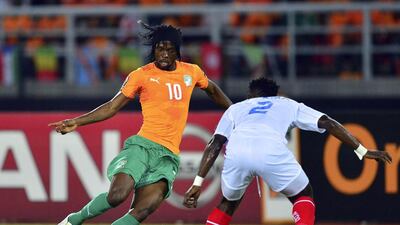BATA, EQUATORIAL GUINEA // After everything, after the rush to get facilities ready, after the complaints over hotels and pitches, after the controversies over refereeing and after the violence of Thursday’s semi-final, the 30th African Cup of Nations has a worthy final.
If it is not a final between the two best teams in Africa, it is at least one between the two teams who are playing the best football, two teams who have beaten the best team in the tournament.
After Ivory Coast had beaten Algeria in the quarter-final, their coach, Herve Renard, acknowledged that his side had eliminated the best team in the tournament.
Algeria arrived with high expectations following a fine World Cup and qualifying series – if perhaps cursing the switch of venue away from Morocco, given no north African side other than Egypt has won the tournament outside of north Africa.
But they were undone by Ivorian diligence and potency on the break.
Renard, who is looking to become the first coach to win the tournament with two different countries, has benefited from the post-golden generation ennui and has created a side that plays like his Zambia did in winning the Cup of Nations three years ago.
Since 2006, Ivory Coast have struggled to live up to their billing as a golden generation, losing in two finals, a semi-final and two quarter-finals. Only four of that 2006 squad remain, though, and one of them is the reserve goalkeeper Boubacar Barry.
There is a sense now that the Ivorians no longer have to impose themselves on every game – now they are not the golden generation, with the likes of Didier Drogba, Didier Zokora and Emmanuel Eboue having departed, they do not have to play golden football.
The process of “renovation”, as Renard has put it, has brought pragmatism and a willingness to play counter-attacking football, which suits their front pair of Wilfried Bony and Gervinho ideally.
Bony wins the ball and holds it up, and is a threat from set pieces, while Gervinho can just run without having to think too much.
There is also a psychological issue, something acknowledged by Kolo Toure, who has had a fine tournament.
He is flanked in a back three by Serge Kanon and Eric Bailly, respectively 21 and 20, and unburdened by the history of failure. Their sense of freshness and optimism has permeated the squad.
Ghana have their own history of failure to overcome.
They were the first great team of African football, but they have not won the Cup of Nations since 1982.
For them, there is a mounting sense of frustration at opportunities missed: defeat in the final in 2010 and two semi-finals since, even if they rather sleepwalked through those latter two tournaments.
Avram Grant, who turned 60 on Friday, has emerged as an unlikely national hero – a status that was only enhanced by his calm amid the trouble in Malabo as Ghana beat the hosts in the second semi-final.
As bottles rained down on the riot shields raised by police to protect players as they emerged from the tunnel, it was Grant who led his team out.
He cut an awkward figure after Ghana’s defeat in their opening game, against Senegal, deflecting criticism of his use of a back three while a bat flitted overhead.
The back four has returned and so, too, has Asamoah Gyan, who missed that opening game through malaria but returned with the late winner against Algeria in the second group game.
A pelvic injury kept the Al Ain striker out of the semi-final, but after three massages a day from a Spanish specialist, he should be fit to start the final.
The climax is a good one, potentially a great one – two giants looking to put right a record of recent failure who have grown into the competition, each with a high-class centre-forward and a popular coach.
It is probably best, though, not to pay too much attention to how the tournament got there.
sports@thenational.ae
Follow us on Twitter at @NatSportUAE

